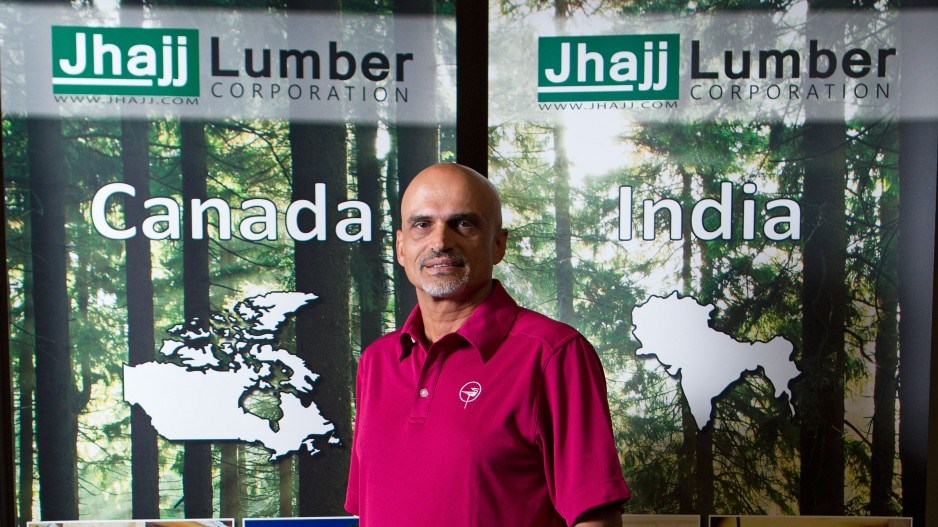In 2011 Parm Jhajj was a mem ber of a City of Surrey delegation that travelled to Dehli to meet with the joint secretary of the Indian Federal Ministry of Agriculture. While there, Jhajj and his fellow delegates scored a historic win for Canadian exports by successfully advocating for the acceptance of Canadian cedar and SPF (spruce, pine and fir) into the Indian market.
Indian lumber buyers were concerned about the mountain pine beetle, which has ravaged trees across western North America.
“What’s happened in the past is people have been concerned about pine beetles, any sort of bacteria travelling from one country to the next,” said Jhajj, who runs Jhajj Lumber, a wholesale lumber distribution company. “So for India we have to make sure all of our wood is heat-treated. So by heat-treated we guarantee that any insects are gone.”
Jhajj – whose company focuses on the domestic industrial market with exports going to countries such as the United States, Mexico, Japan, China, Taiwan and the Arabian Gulf – was also able to line up a deal of his own on the 2011 trip, shipping five containers containing 175,000 board feet of B.C. SPF lumber to Port Kandla, India, to be used for new construction.
“Making that trip to India and getting a little bit of positive press out of it, it certainly helped us out,” he added.
City of Surrey councillor Linda Hepner, who was also on the trip, said Jhajj was instrumental in helping to break down some misconceptions about the mountain pine beetle, plus Canadian wood and international trade requirements in general.
“He made some significant inroads,” Hepner said. “I think fundamentally it actually shows a perfect example of cities being economic engines. And shows the kind of successes we can have directly with businesses abroad.”
Jhajj said they got a chance to directly lobby the Indian government about key issues that were hurting lumber trade between the two countries.
“Tariffs are always a concern on saw lumber [in India],” he said. “But it’s a whole lot less than it used to be. For years and years it was about 40%, and it’s a whole lot less now. So it was a recognition by the powers that be there that things are changing. … [Indian] wholesalers brought logs in and sliced and diced there, from the beginning … they discouraged manufactured lumber from other parts of the world. And now reality had set in for them, and because of that they started relaxing the tariffs.”
Jhajj added that while headway has been made, there’s still a long way to go.
“There’s a lot of fragmentation in the market there, and because of that it’s very difficult for any one company to truly make a dent because there’s so many small players there. And so you match up with somebody and you do maybe 10, 15, 20 containers and that seems to be the max for a lot of the guys down there. There’s not any continuity as say there is in Japan or Taiwan or Korea or China right now.”
Hank VanOosten, a lumber trader at Westminster Industries Ltd. based in White Rock, echoed Jhajj’s statement.
“I agree with Parm with respect to continuity,” VanOosten said. “In some cases the mechanics required to secure orders, especially the letters of credit, were such an ordeal I found it really wasn’t worth the effort for small orders of up to 20 containers. I have had a much easier time selling lumber to secondary remanufacturers in B.C., who have a steady flow going into the Indian market.
“Obviously this form of double wholesaling only works in a Bull market, but makes for good clean business.”
Hardwood demand rising
India’s demand for hardwood logs, used primarily for furniture and molding, is growing, but the country’s main suppliers (Indonesia, Burma and Malaysia) are running out of wood due to illegal logging and overharvesting. This has created opportunities for B.C. suppliers, said Jhajj, who is considering opening up a warehouse in India in 2015.
“We’re looking at it very, very seriously. The long-term potential is definitely there. The world isn’t growing any more trees and more and more jungles are being replaced by farmland or by developments. We’re fortunate enough here that we’ve got an abundance. If anything the Canadian industry is going to dominate more on a world scale than they have in the past.”




